Double disc (Pictish symbol)
The double disc is a Pictish symbol of unknown meaning, that is frequently found on Class I and Class II Pictish stones,[1] as well as on Pictish metalwork.[2][3] The symbol can be found with and without an overlaid Z-rod (also of unknown meaning), and in combinations of both (as with the Monifieth 1 stone).
Gallery
- Aberlemno 1; Class I stone with double disc and Z rod
 Dunnichen Stone; Class I with double disc and Z rod
Dunnichen Stone; Class I with double disc and Z rod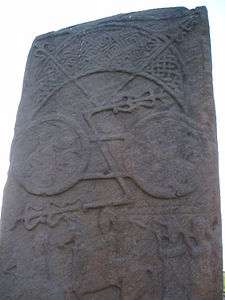 Aberlemno 3 rear face detail; Class II
Aberlemno 3 rear face detail; Class II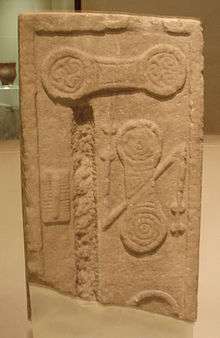 Monifieth 1; Class II stone with double discs with and without Z-rod
Monifieth 1; Class II stone with double discs with and without Z-rod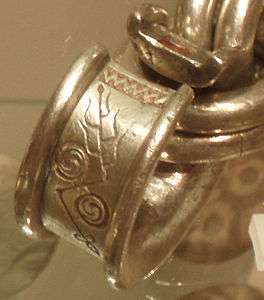 Detail of penannular ring on Whitecleuch Chain showing double disc and Z-rod
Detail of penannular ring on Whitecleuch Chain showing double disc and Z-rod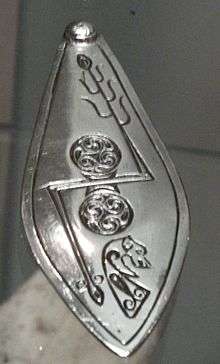 Plaque from Norrie's Law hoard showing Double disc and Z-rod
Plaque from Norrie's Law hoard showing Double disc and Z-rod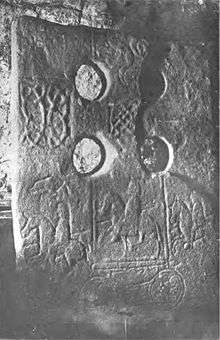 Fordoun stone
Fordoun stone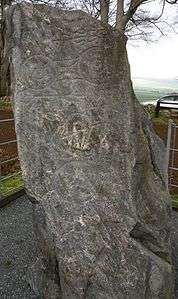 Picardy stone
Picardy stone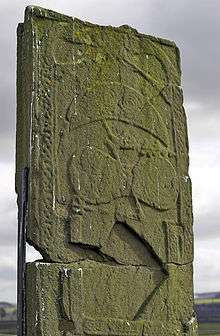
- Woodwrae Stone rear face
gollark: I mean, you could do that, but then nobody uses your thing.
gollark: Paid by whom? You want to charge end users capital?!
gollark: It would be nice if it was possible to make incentives for these things work.
gollark: osmarksnetnet™ operates as a mesh overlay network nowadays.
gollark: Oh, so just big directional antennas, not satelliteuous things with LNBs and whatever.
References
- Fraser, Iain (2008), The Pictish Symbol Stones of Scotland, Edinburgh: Royal Commission on the Ancienct and Historic Monuments of Scotland
- Graham-Campbell, James (1991), "Nome's Law, Fife: on the nature and dating of the silver hoard" (PDF), Proceedings of the Society of Antiquaries of Scotland, 121: 241–259, archived from the original (PDF) on June 11, 2007, retrieved August 2, 2010
- Clark, J Gilchrist (1880), "Notes on a Gold Lunette found at Auchentaggart, Dumfriesshire, and a Massive Silver Chain found at Whitecleugh, Lanarkshire, exhibited by His Grace The Duke of Buccleuch." (PDF), Proceedings of the Society of Antiquaries of Scotland, 14: 222–224, retrieved August 1, 2010
This article is issued from Wikipedia. The text is licensed under Creative Commons - Attribution - Sharealike. Additional terms may apply for the media files.